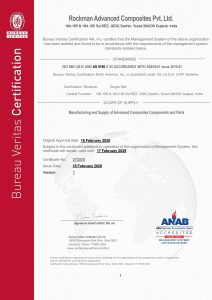Enthusiasts who are curious to discover the world of composite materials will find here a comprehensive understanding of this engineered material. This innovative material has infiltrated into aerospace, automobile, energy, marine, general, and civil engineering sectors, revolutionising methodologies and techniques. The transformative impact and potential of these materials are making these materials useful across diverse industries. The mastermind behind these innovative materials, composite material manufacturers is gearing up to set the stage for a future that is built on efficient, more sustainable, and high-performing materials. Known for their strength, durability, and lightweight properties, these materials have revolutionized various industries, from aerospace to automotive to construction, and manufacturers of these materials are driving advancement across multiple industries.
Innovations and Trends Adopted by Composite Material Manufacturers
The composite material industry is continually evolving, driven by the need for more efficient, durable, and sustainable materials. Key trends include:
Sustainability – Composite materials manufacturers are increasingly focusing on eco-friendly composites made from renewable resources and recycled materials.
Advanced Manufacturing Techniques – Manufacturers are adopting innovations like automated fiber placement (AFP) and additive manufacturing (3D printing) to enhance production efficiency and material performance.
Nanocomposites – The incorporation of nanomaterials, such as carbon nanotubes, is leading to composites with unprecedented strength and electrical conductivity.
Smart Composites – Integration of sensors and smart technologies into composites is enabling real-time monitoring of structural health and performance.
The Importance of Composite Materials across Diverse Industries
Composite materials have been on the upsurge for the last few years and the market of these materials has crossed over $38 billion. However, it is just a fraction of the value composite materials bring across diverse industries, and this sector as a whole along with products has now crossed $107.4 billion. Composite materials play a key role in production and lead to advancement across diverse industries. The significance of these materials across diverse industries is discussed below:
Aerospace Industry for High Strength-to-Weight Ratio
The aerospace industry always prefers lightweight and durability and composite materials turn out to be more of a reality than ever before. Carbon fiber has been the key material within this sector and its usage has grown by 290% since 2012. Leading aircraft manufacturers are moving their production initiatives to composite materials due to their lightweight nature combined with high strength that contributes to fuel efficiency and enhances the overall performance of aircraft.
Marine Industry for Durability and Corrosion Resistance
In the marine sector, composite materials are utilized for boat hulls and other components due to their superior resistance to water, salt, chemicals, and other erosive substances. Due to this, composite materials are firmly rooted in the marine industry, ensuring durability in harsh marine environments. According to the National Marine Manufacturers Association, boat sales have been on the high in recent times.
Automobile Industry for Flexibility in Design
Composite materials offer design flexibility, allowing the creation of streamlined and fuel-efficient vehicles. These materials are primarily used in body panels, chassis components, and interior parts, leading to the overall efficiency and aesthetics of automobiles.
Electrical Industry for Electrical and Thermal Insulation
Composite materials having excellent insulating properties are used in electronic components, providing protection and essential electrical insulation. This further enhances the safety and performance of electronic devices.
Sports Industry for Tailored Mechanical Properties
Composite materials are increasingly used in the sports industry because of their ability to customize mechanical properties. This makes them ideal for sporting goods like golf clubs, tennis rackets, and bicycles. Because of the customization ability of the materials designers can optimize performance characteristics for various sports equipment.

Chemical Industry for Resistance to Chemicals
In chemical processing, composites are favoured for their resistance to corrosive chemicals. This resistance ensures that equipment maintains structural integrity even in the most challenging environments, leading to longer lifespans and improved safety.
Medical Industry for Biocompatibility
Certain composite materials are bio compatible, making them suitable for use in medical devices, implants, and prosthetics. Their compatibility with biological tissues ensures safety and effectiveness in medical applications.
Future Prospects of Composite Material
Composite material is the obvious choice for many industries looking for innovation and is soon expected to make its mark in emerging industries. These materials are sure to lead to better production standards, and longer product life at reduced cost. With a focus on sustainable practices, composite materials will be a natural fit for the manufacturing sector of the future. Some potential future developments include:
Next-Generation Aerospace Components – With the ongoing demand for lightweight, fuel-efficient aircraft, composite materials will play a critical role in the next generation of aerospace technology.
Electric Vehicles – With automotive industry shifting towards electric vehicles, the need for lightweight, high-strength materials will drive innovation in composites.
Infrastructure Renewal – Aging infrastructure around the world will benefit from durable, corrosion-resistant composite materials, ensuring longer lifespans and reduced maintenance costs.
Composite material manufacturers are at the forefront of technological innovation, driving advancements across multiple industries. Their work not only enhances product performance and sustainability but also paves the way for future innovations. As you explore the world of composites, you’ll discover how these materials and their manufacturers are shaping the future of engineering and design.








